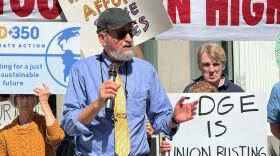
Moving from crisis to crisis — for too long that's been America's strategy for dealing with the challenges of an aging transit infrastructure, from roads, to bridges to ports. The result is a system that's crumbling and in desperate need of attention, according to a new report from the U.S. Department of Transportation. The massive study looks both at the current state of the country's transportation systems and forecasts what challenges lie ahead.
"Over the next 30 years, we're going to have 70 million more people in this country, and all those people are going be trying to get someplace on top of the number of people we have," Transportation Secretary Anthony Foxx told NPR's Morning Edition. "So the congestion we have today is expected to get worse, unless we do something radical now." He says that, along with the president, he feels it's important to make a "substantial pivot" toward investing more in the country's transportation system.
Interview Highlights
On the 5.5 billion hours we're spending in traffic
One of the statistics that comes out of this report is on the average year, people are spending about 5.5 billion hours in traffic, to the tune of $120 billion of lost time and cost — gasoline and other things. That's because the congestion is continuing to grow in some of our fastest-growing areas.
That doesn't have to be the reality going forward. Clearly, we need to make investments at the federal level, not only to maintain the system we have but to improve and build new capacity where we need it. We also need to make sure we're making smart choices about how that infrastructure gets built so we get the most throughput out of that infrastructure.
On how manufacturing will affect traffic
We have more manufacturing activity now than we've had over the last 15 years and we expect that to grow. We're expecting over the next 30 years, a 60 percent increase in truck traffic on our freeways. The bottom line is, if you're stuck in traffic today and your travel time's longer than it was 10 years ago, it's likely to get worse unless we take some very important steps at the federal, state and local level before it gets worse.
On his proposal to improve highways and rails
The president and I have a proposal for surface transportation – highways, and transit, and rail – that would use pro-growth, business tax reform. Taxing untaxed corporate earnings that are overseas, and having those earnings come back home and being put to work for infrastructure.
It's a one-time fix, but it's also a fix that doesn't increase deficits and doesn't require tax increases, and allows us to basically double what the gas tax is putting into the system today. So we think it's important to make a very substantial pivot toward much greater investment.
Copyright 2015 NPR. To see more, visit http://www.npr.org/.






